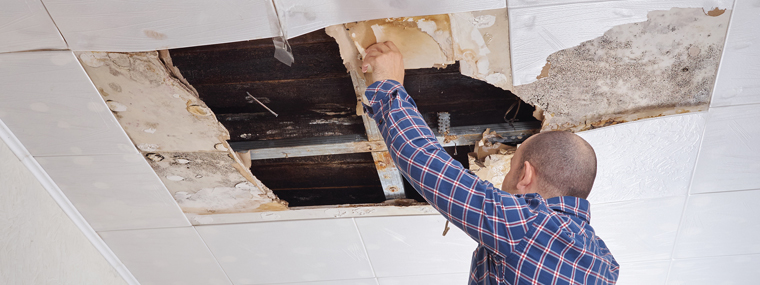
How Do Hurricane Damage Repairs Work?
By Ryan D. Poliakoff / Published July 2018

Q
uestion:
I’m a property manager in a high-rise condominium tower, and every time I think I understand how hurricane damage repairs work, I hear or read something that makes me think I was completely wrong. For example, our attorney has told us that we are normally responsible for only perimeter drywall, but after Hurricane Irma, I had owners call and demand that we repair all of their drywall, even inside the unit. Similarly, our condominium declaration says that owners are responsible to maintain and repair their windows, but our insurance agent wants us to buy a glass insurance policy. I’m missing something obvious here, and I’m hoping that you can help me out before the hurricane season hits in full force.
Answer:
Your confusion is reasonable, but despite this being a complicated issue, I will try to explain the legal analysis as simply as possible. The Condominium Act, at Section 718.111(11), describes the association’s responsibility to insure the condominium property. Every property insurance policy issued to a condominium must insure all portions of the condominium property as originally installed, or replacement of like kind and quality, as well as all properly-approved material alterations or additions, excluding certain specific items within units. These excluded items include flooring, wall coverings, cabinets, water heaters, window treatments, appliances, and electrical fixtures.
If the condominium property (the common elements, limited common elements, or the units) is damaged by an insurable event, the association is responsible to repair or replace all insured items. In contrast, if the condominium property is damaged by anything other than an insurable event, you look to the declaration of condominium to determine the repair responsibility.
So, let’s consider a typical condominium scenario. Assume, first, that the declaration of condominium states that the association is responsible to maintain and repair perimeter drywall, but that the unit owner is responsible to maintain and repair drywall inside the unit boundaries. Now, assume further that a sprinkler pipe explodes and floods a unit, damaging all of the drywall. Because the burst pipe is an “insurable event,” you ignore the declaration and go by the responsibilities outlined in the statute. The association will be responsible to replace all damaged drywall in the unit. However, let’s assume instead that a toilet in an upstairs unit is leaking around the seal, and that there is some water damage on an interior bathroom wall. A slowly leaking toilet would likely not be an insurable event, and so you would look to the declaration to establish the repair and maintenance responsibilities—and so the owner would be responsible to repair his or her own drywall.
Now, let’s take that analysis and expand it to a hurricane. When there is property damage of any kind, the first part of the analysis is to determine whether the damage was caused by an insurable event. A hurricane is an insurable event, and most of the damage caused would be insurable as well. Your condominium certainly has windstorm insurance, although the deductibles are typically so high that you would only recover if the damage is severe. If the building suffers broken windows or rain-soaked drywall, the association will be responsible to repair those windows and that drywall, even if the declaration would ordinarily put responsibility for those items in the hands of the unit owners. You just have to keep in mind that, where an insurable event is concerned, you look to the statute and not the declaration of condominium.
With that said, I’m going to step back and complicate matters a bit. Even if condominium property is damaged by an insurable event, the Condominium Act provides that the unit owner is responsible for the cost of any damage not reimbursed by insurance where that damage was the result of the owner’s negligence or failure to abide by the governing documents or rules and regulations. Assume, for example, that your declaration states that all owners must close their hurricane shutters as soon as a hurricane watch is announced. One of your unit owners is out of town and fails to close his shutters, and his window breaks, allowing rainwater to flood the unit and damage several units below. In that situation, even if the total amount of the damage falls below the insurance deductible, you can hold the owner responsible for the costs of repair and charge those amounts to the owner’s account and collect them by lien and assessment.
You can think of this analysis as a flow chart. You would start at the top with an event damaging the condominium. Is it an insurable event? If so, the Condominium Act governs the repair responsibility. If not, the declaration of condominium controls. Once you have made that determination, you also need to consider whether the damage was the result of unit owner negligence. If it was, the association is still responsible for the repair, but those costs can be passed down to the owner.
I can also tell you, as a practical matter, that you should establish procedures or rules requiring owners to report damage to their units as quickly as possible following a storm, so that the association can mitigate any damage (given that much of the damage is the association’s repair responsibility).
Ryan D. Poliakoff
partner of Backer Aboud Poliakoff & Foelster
Ryan D. Poliakoff is a partner of Backer Aboud Poliakoff & Foelster and serves as general counsel to condominiums, homeowners associations, and country clubs throughout South Florida. He is the co-author of New Neighborhoods—The Consumer’s Guide to Condominium, Co-Op, and HOA Living. In addition to representing associations, he is a frequent contributor at seminars and workshops for attorneys and board members, and he has written hundreds of articles for magazines and newspapers throughout the United States. He can be reached at rpoliakoff@bapflaw.com. For more information about his firm, visit www.bapflaw.com.


